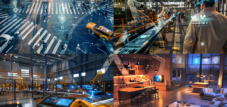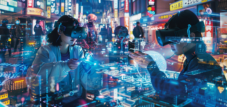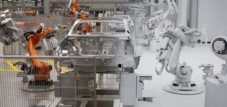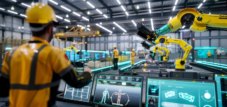The clever factory with industrial AI: in addition to robotics of clever sensors to the fully automatic factory
Xpert pre-release
Language selection 📢
Published on: May 23, 2025 / update from: May 23, 2025 - Author: Konrad Wolfenstein

The clever factory with industrial AI: in addition to robotics of clever sensors to the fully automatic factory - Image: Xpert.digital
Efficiency increase and innovation: the power of industrial AI
Sustainability and cost reduction: the advantages of industrial AI
Industrial AI has developed into a transformative force that revolutionizes industries through the automation of processes, increasing efficiency and the development of new business opportunities. This technology goes far beyond simple automation and represents a fundamental paradigm shift in industrial value creation. From the forward -looking maintenance to the optimization of global supply chains, industrial AI not only transforms industrial AI, but entire branches of industry and creates new opportunities for efficiency increases, cost reductions and sustainable production processes.
Suitable for:
- Cost reduction through artificial intelligence - between profitability calculation and the future strategy
Industrial AI: Key technology for smart processes
Industrial AI, also referred to as industrial artificial intelligence, is the application of artificial intelligence to industrial applications such as the movement and storage of goods, supply chain management, extended analysis as well as automation and robotics in production. This specialized form of AI refers to the use of artificial intelligence in industrial environments such as manufacturing, energy sector, aerospace and space travel and construction.
Industrial AI is fundamentally different from other AI species by their specific focus on the application of AI technologies instead of the development of human-like systems. The data records for industrial AI tend to be larger, but potentially of less quality than that for general AI. A crucial feature is the zero tolerance for false-positive or false-negative results, delayed knowledge or unreliable predictions.
The technology uses data, machines and networks data to improve decision -making, increase productivity and promote innovations. Industrial AI is particularly suitable for process systems, since the enormous amounts of data and rapidly changing circumstances are too complex for manual or even digital administration.
Differentiation to general artificial intelligence
The fundamental difference between general AI and industrial AI lies in their respective objectives and application. While general AI aims to simulate human intelligence in a wide range of tasks, Industrial AI focuses on specific industrial applications. General AI, which can often be seen in tools such as chatbots and virtual assistants, is designed to perform tasks that require argument and natural understanding of language.
Industrial AI, on the other hand, is more focused on the application of AI technologies than on the development of human or human-like systems. It is specifically tailored to automate and optimize complex industrial processes. This specialization enables industrial AI to rationalize and automate operational processes, even without human participation up to “self -configuring factories”.
Another significant difference lies in data processing and the tolerance limits. Industrial AI processes large amounts of industrial data from factory sensors such as vibration readings, temperature profiles or dimension measurements. A typical automobile factory can generate terabytes on sensor data every day, from robotic arm positions to torque values.
Areas of application and specific use scenarios
The applications of industrial AI extend across the entire industrial value chain and can be divided into eight essential fields of application. These areas show concrete economic advantages and offer considerable levers for future added value.
Forward -looking maintenance and system optimization
Predictive analytics and forward-looking maintenance combine IoT data with deep learning to model large-scale networks, help to recognize the earliest signs of anomalies anywhere in the system, to reduce unplanned downtime and to optimize the maintenance planning. AI algorithms analyze sensor data such as vibration, temperature, pressure and oil quality in real time and recognize subtle anomalies and patterns that indicate an upcoming failure.
Self -confident “intelligent” equipment can measure the performance independently to generate warnings when degradation reaches a critical point or the performance is reduced for any reason. This technology enables maintenance work to be planned exactly when they are really necessary - before a problem arises.
Production optimization and quality control
Industrial AI applications in production optimization include the intelligent adaptation of process parameters in real time. In a steel mill, algorithms adjust the roll pressure based on sheet metal measurements. In chemical systems, industrial AI balances hundreds of process variables to maximize the yield and at the same time to comply with quality restrictions.
By continuous monitoring production processes and identification of errors in real time, KI ensures that products meet high standards and the product quality is improved. EDGE devices can quickly remove inferior products from production lines, which means that high quality standards and throughput levels are maintained.
Supply chain management and inventory optimization
In the supply chain control, algorithms pursue material consumption patterns and disorders, adapt automatically order quantities and delivery plans to prevent storage bottlenecks and at the same time minimize storage costs. AI-supported systems analyze historical consumption data and identify seasonal trends and demand fluctuations, which means that replacement cycles and order quantities can be better planned.
Complex supply chain management increases visibility in every step of the process, including the persecution of raw materials, inventory and warehouse management. This leads to reduced excesses and bottlenecks, lower storage costs, higher care security and better liquidity.
Technological basics and implementation
The technological basis of industrial AI includes various key technologies that work together to transform industrial processes. Machine learning algorithms enable forward-looking maintenance and quality assurance through the analysis of industrial data for predicting device failures and identification of errors.
Internet of things and sensor technology
IoT devices and industrial AI work symbiotically together. Industrial AI improves the interpretation of data from IoT devices, identifies patterns, predicts failures and automates decisions. AI models analyze sensor data flows to increase efficiency, reduce waste and improve quality control.
Sensor technology in connection with Industrial AI converts Rohe Sensor data into implementable knowledge. Computer vision examines error patterns in production, while machine learning identifies anomalies in vibration data to prevent failures. AI SEISORSBUSION Combines input to improve the forward-looking maintenance.
Suitable for:
- Humanoid robots, agricultural robotics and underwater robotics: what AI, sensors and digital twins enable
Edge computing and real-time analysis
Edge AI delivers on-device analysis to reduce latency in robotics and quality inspection. AI uses IoT connectivity to create self-learning systems, analyze sensor data to find correlations and optimize processes. This integration enables real-time data analysis for forward-looking maintenance, reduces downtime and increases productivity.
The combination of edge computing with industrial AI enables more intelligent, more efficient and autonomously optimized industrial ecosystems. By embedding AI in IIOT systems, it uses machine learning and extended analysis to derive implementable intelligence from raw sensor data.
🎯📊 Integration of an independent and cross-data source-wide AI platform 🤖🌐 for all company matters

Integration of an independent and cross-data source-wide AI platform for all company matters-Image: Xpert.digital
Ki-Gamechanger: The most flexible AI platform-tailor-made solutions that reduce costs, improve their decisions and increase efficiency
Independent AI platform: Integrates all relevant company data sources
- This AI platform interacts with all specific data sources
- From SAP, Microsoft, Jira, Confluence, Salesforce, Zoom, Dropbox and many other data management systems
- Fast AI integration: tailor-made AI solutions for companies in hours or days instead of months
- Flexible infrastructure: cloud-based or hosting in your own data center (Germany, Europe, free choice of location)
- Highest data security: Use in law firms is the safe evidence
- Use across a wide variety of company data sources
- Choice of your own or various AI models (DE, EU, USA, CN)
Challenges that our AI platform solves
- A lack of accuracy of conventional AI solutions
- Data protection and secure management of sensitive data
- High costs and complexity of individual AI development
- Lack of qualified AI
- Integration of AI into existing IT systems
More about it here:
Industrial AI as a competitive advantage: opportunities, risks and best practices
A lack of skilled workers and uncertainty: The biggest hurdles at Industrial AI
Despite the enormous potential of Industrial AI, companies face considerable challenges in implementation. The manufacturing industry is currently faced with the beginning of a serious shortage of labor, which is partly due to the massive pension entries of the baby boomers working in this sector.
Lack of expertise and qualification deficits
Manufacturing skills are in great demand and experienced and qualified factory workers are rare. According to Bitkom, 42 percent of industrial companies indicate that they lack the necessary know-how to integrate AI sensibly into existing processes. This challenge can be addressed through training, retraining and a culture of continuous learning.
Successful AI implementation needs qualified staff, which can be addressed through training, further qualification and a culture of continuous learning. Around half of the companies are waiting for the experiences of other companies - a clear sign of uncertainty and lack of trust in the practical implementation.
Data quality and system integration
Industrial AI applications are often faced with the problem of data availability, since extensive reference data rates rarely exist due to high confidentiality requirements and high specificity of the data. Unsuitable and incomplete data pose another challenge.
The integration of AI into manufacturing systems brings challenges due to compatibility and resistance to changes. Best practices focus on planning, pilot projects and stakeholder engagement. In addition, there are concerns about data security and data protection, which can be solved by encryption, access controls and compliance with the GDPR.
Suitable for:
- In 2025, smart re-manufacturing and circular economy will be a topic in manufacturing alongside AI and robotics to combat the shortage of skilled workers
Economic importance and market development
The economic importance of industrial AI for German industry is considerable and is growing continuously. According to a current Bitkom survey, 42 percent of the industrial companies of the processing trade in Germany are already using this technology in their production-another third (35 percent) is planning appropriate projects.
Competitiveness and future prospects
78 percent of German industrial companies are convinced that the use of AI will in future be decisive for the competitiveness of German industry. For 70 percent, AI is even the most important technology for the future viability of German industry. Accordingly, 82 percent of the manufacturing companies will find that German industry should take a pioneering role when using AI.
A VDMA study that looks specifically on machine and plant engineering and the use of generative artificial intelligence in the roof room shows that 79 percent of companies already use generative artificial intelligence or are planning to use. 89 percent see this an important lever for future profitability.
Efficiency and cost reduction
Industrial AI significantly reduces production costs, as is shown using the example of Siemens' Amberg Electronics Plant, which uses AI-controlled forward-looking maintenance to eliminate defects. The technology enables teams to make well -founded, flexible decisions, which leads to reduced downtime, improved efficiency and consistent productivity improvements throughout the company.
The monitoring of energy consumption, asset performance and resource consumption can be reduced. Improved visibility of the sustainability of suppliers enables better cooperation and data -controlled decisions that match the environmental goals.
Fully autonomous industrial plants: the future of physical AI and digital twins
The future of Industrial AI is characterized by the vision of completely autonomous industrial facilities. In the heart of the industrial AI revolution, physical AI or AI-capable robotics, which will enable completely autonomous industrial systems in the future. AI-capable robots are increasingly being trained and tested in digital twins industrial plants, which allows you to perform complex tasks with precision and efficiency.
Digital twins and simulation
This digitization of industrial systems increases automation and further improves productivity, while the need for human intervention is reduced in dangerous environments. Digital twins, virtual representations of physical systems, enable companies to simulate and verify the performance of industrial AI models and applications in a digital real-time environment before being used in real industrial systems and systems.
The concept of the digital twin plays a central role and changes the way in which industries and processes are understood. A digital twin is more than a simple virtual representation of a physical object; Rather, it is a living, developing entity that can almost exactly reflect the behavior of his real counterpart in the digital world and affect the physical object.
Sustainability and environmental effects
Industrial AI plays a crucial role in minimizing the environmental impact of industries. By optimizing resource use and energy consumption, AI-controlled solutions promote more sustainable practices. This is particularly important because industries strive to meet regulatory requirements and social expectations for more environmentally friendly operations.
With industrial AI, environmental impacts along the value chain can be analyzed and controlled in real time. The technology enables CO₂ footprints to be monitored and reduced, while gross focus is also possible.
Suitable for:
From pilot projects to strategy: Use industrial AI correctly
Industrial AI has developed from a future concept to a strategic imperative for modern industrial companies. The technology offers transformative options for optimizing production processes, improving efficiency and development of new business models. While the potential is significant, companies face significant challenges in implementation, especially with regard to a shortage of skilled workers, data quality and system integration.
The success of Industrial AI depends crucially on how companies master these challenges and develop a strategic, company -wide approach. Instead of isolated pilot projects, companies need a coherent AI strategy that includes all specialist departments and builds on a solid database. German industrial companies recognize the importance of this technology for their future viability and competitiveness, but must take the step of knowledge to consistent implementation.
The future promises even more far -reaching changes through the integration of physical AI, digital twins and autonomous systems. These developments will not only increase efficiency and productivity, but will also create new opportunities for sustainable and resilient industrial structures. Companies that invest today in industrial AI and build up the necessary skills will be able to play a leading role in the digital transformation of industry.
We are there for you - advice - planning - implementation - project management
☑️ SME support in strategy, consulting, planning and implementation
☑️ Creation or realignment of the digital strategy and digitalization
☑️ Expansion and optimization of international sales processes
☑️ Global & Digital B2B trading platforms
☑️ Pioneer Business Development
I would be happy to serve as your personal advisor.
You can contact me by filling out the contact form below or simply call me on +49 89 89 674 804 (Munich) .
I'm looking forward to our joint project.
Xpert.Digital - Konrad Wolfenstein
Xpert.Digital is a hub for industry with a focus on digitalization, mechanical engineering, logistics/intralogistics and photovoltaics.
With our 360° business development solution, we support well-known companies from new business to after sales.
Market intelligence, smarketing, marketing automation, content development, PR, mail campaigns, personalized social media and lead nurturing are part of our digital tools.
You can find out more at: www.xpert.digital - www.xpert.solar - www.xpert.plus





























